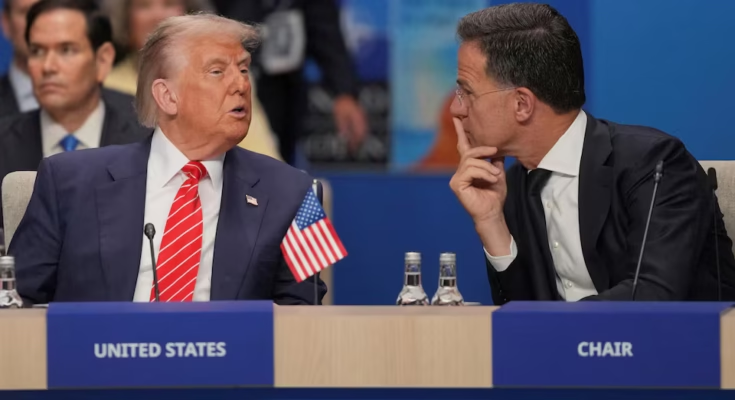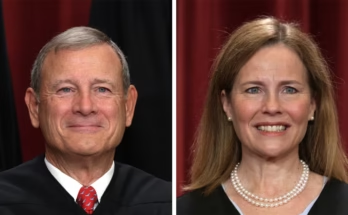NATO summit 2025 live: Rutte tells Trump the alliance will raise defence spending to 5%
Summary
- Alliance set to adopt higher target of 5% of GDP
- Allies hope for clear commitment to pact from U.S. President Donald Trump
- Spain says it does not need to meet new target
- NATO boss Rutte lavishes praise on Trump
- Summit text expected to cite Russia as a threat and reaffirm support for Ukraine
- Read our full roundup here
Live: Extinction Rebellion protesters gather nearby
17:08 +07
The meeting is underway
17:09 +07
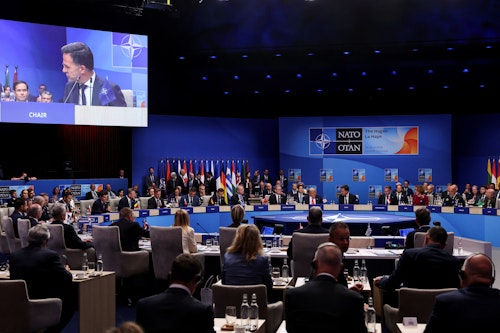 The Hague, Netherlands June 25, 2025. REUTERS/Toby Melville
The Hague, Netherlands June 25, 2025. REUTERS/Toby Melville
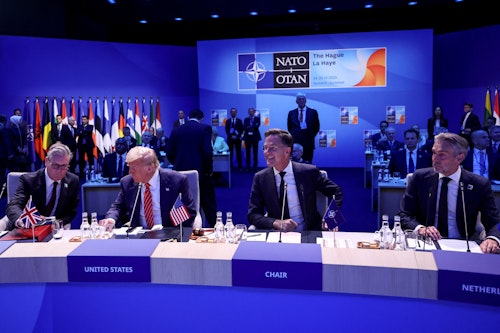
REUTERS/Toby Melville
What is NATO’s Article 5?
16:53 +07
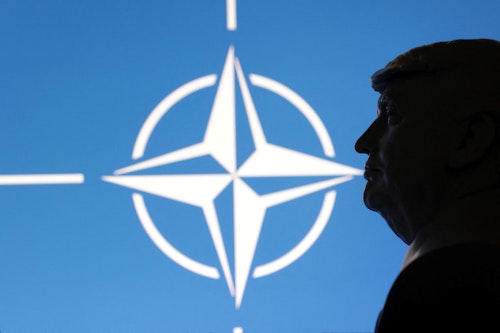
FILE PHOTO: Illustration of a miniature model of Trump with the NATO logo taken April 23, 2025. REUTERS/Dado Ruvic/Illustration
NATO was created in 1949 with the U.S. military as its powerful mainstay essentially to counter the Soviet Union and its Eastern bloc satellites during the Cold War.
Article 5 of NATO’s founding charter, the North Atlantic Treaty, stipulates that “the Parties agree that an armed attack against one or more of them in Europe or North America shall be considered an attack against them all.”
NATO currently has 32 members – most of them European nations, plus the United States and Canada.
Article 5 has been activated once before – on behalf of the United States, in response to the September 11, 2001, hijacked-plane attacks on New York and Washington.
Speaking to reporters en route to The Hague summit, Trump had cast doubt over the United States’ commitment to defending its NATO partners, suggesting there were “numerous” definitions of the alliance’s mutual defence pact.
However, as we reported earlier, when asked about Article 5 on Wednesday, he told reporters: “We’re with them all the way.”
White sneakers and colourful ties at the family photo
16:43 +07
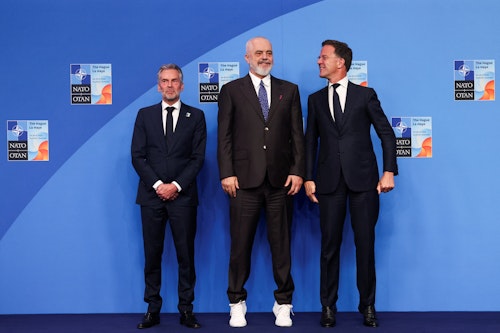
Albanian Prime Minister Edi Rama (centre) with Mark Rutte and Dutch Prime Minister Dick Schoof , The Hague, June 25, 2025. REUTERS/Yves Herman
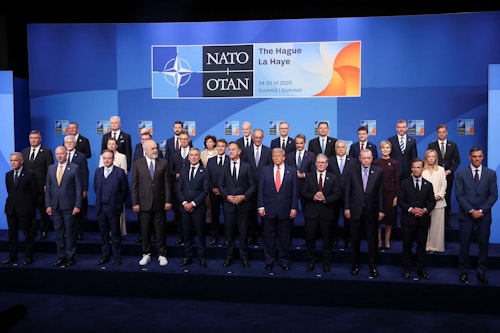
NATO leaders, The Hague, June 25, 2025. REUTERS/Claudia Greco
Reaching 5% by 2035 is too late, says Lithuanian president
16:22 +07
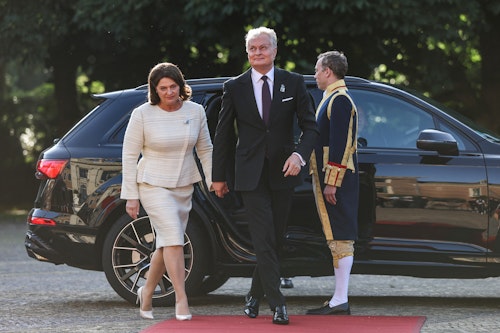
FILE PHOTO: Nauseda in The Hague, June 24, 2025. REUTERS/Toby Melville
Reaching the 5% spending target on defence by 2035 is too late and NATO’s defence spending is lagging behind that of Russia, Lithuanian President Gitanas Nauseda told reporters on Wednesday.
He said NATO needs a frank discussion about its Article 5 mutual defence clause.
Without Trump’s engagement, NATO would only be talking about spending 2.5% of gross domestic product for defence, he added.
His remarks come after NATO members agreed on Sunday to raise their spending target to 5%.
Enshrined in Article 5 of NATO’s founding treaty is the principle of collective defence – the idea that an attack on one member is considered an attack on all of them.
‘We’re with them all the way’, Trump says of NATO’s Article 5
16:18 +07
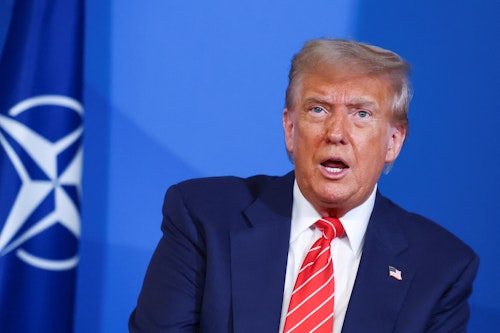
Trump at the NATO leaders summit, Netherlands June 25, 2025. REUTERS/Piroschka Van De Wouw/Pool
Asked about Article 5 of NATO’s charter on Wednesday, Trump told reporters: “We’re with them all the way.”
Speaking to reporters en route to a NATO summit Trump had cast doubt over the United States’ commitment to defending its NATO partners, suggesting there were “numerous” definitions to the cornerstone of the alliance’s mutual defence pact.
Denmark says NATO 5% spending target is necessary
16:08 +07
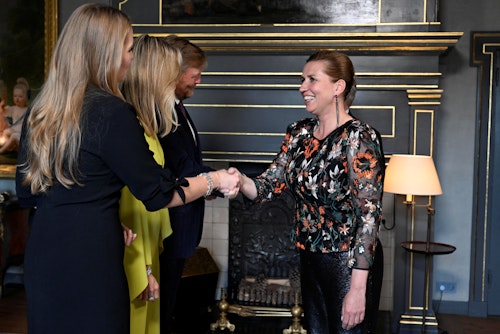
FILE PHOTO: Frederiksen in The Hague, Netherlands June 24, 2025. MISCHA SCHOEMAKER/Pool via REUTERS
NATO‘s 5% spending target is important and necessary because the military alliance is lagging behind in defence spending, Danish Prime Minister Mette Frederiksen told reporters on Wednesday.
“The disarmament was allowed to go on for too long, so our starting point means that we are really, really, really, really, busy,” Frederiksen said.
Hungarian PM Orban says Russia is not a real threat to NATO
15:56 +07
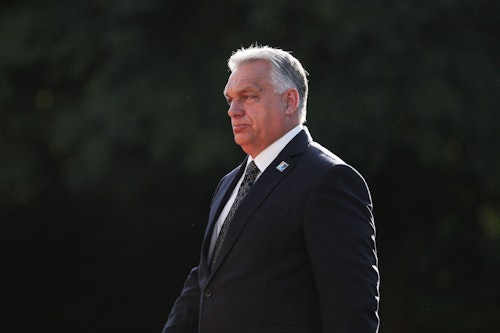
FILE PHOTO: Hungarian Prime Minister Viktor Orban, The Hague, Netherlands June 24, 2025. REUTERS/Christian Hartmann
Russia is not strong enough to represent a real threat to NATO as the alliance is “far stronger,” Hungarian Prime Minister Viktor Orban said on arrival at the summit.
“The real threat is not security wise, it’s economic and losing our competitiveness on the global trade,” Orban added. “NATO has no business in Ukraine. Ukraine is not member of NATO, neither Russia.”
“I think Russia is not strong enough to represent the real threat to us. We are far stronger.”
Orban also said Trump was a “man of the common sense”.
“Which means that the new wars are getting shorter and the old wars are running out of the fuel which is by which is the consequence of his activity,” he said.
Trump says the Iranian nuclear program is put back decades
15:47 +07
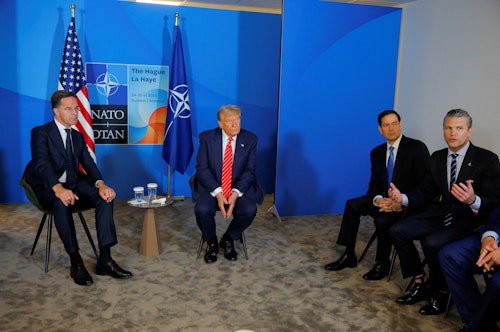
Hegseth speaks alongside Rubio during a meeting between Trump and Rutte at the NATO summit, Netherlands, June 25, 2025. REUTERS/Brian Snyder
Trump said the U.S. strikes on Iran “ended the war” between Iran and Israel and Tehran’s nuclear program has been put back decades.
In response to questions about the leaked intelligence, he said he believed the strikes led to “total obliteration” and the reports “really don’t know”.
He also said the intelligence following the strikes on nuclear sites was inconclusive.
“The intelligence was very inconclusive. The intelligence says we don’t know. It could’ve been very severe. That’s what the intelligence suggests,” Trump told reporters.
“It was very severe. There was obliteration,” he added.
Asked if the United States would strike again if Iran rebuilt its nuclear enrichment programme, Trump said: “Sure.”
Defence Secretary Pete Hegseth said the bombs landed right where they were supposed to and there was low confidence in the leaked intelligence.
The Iranian conversion facility can’t even be found on the map, it is wiped out, Secretary of State Marco Rubio said.
Read more here.
Recap: US strikes may have set back Iran nuclear program only months, sources say
15:40 +07
Trump and his Defense Secretary Pete Hegseth and Secretary of State Marco Rubio are being asked by reporters about leaked intelligence on the impact of U.S. strikes on Iran’s nuclear facilities.
The preliminary U.S. intelligence assessment determined that U.S. strikes over the weekend have set back Tehran’s program by only a matter of months, three sources with knowledge of the matter told Reuters.
The initial report was prepared by the Defense Intelligence Agency, the Pentagon’s main intelligence arm and one of 18 U.S. intelligence agencies, said two of the sources, who requested anonymity to discuss classified matters.
The assessment found that Iran could restart its nuclear program in a matter of months, according to the three sources, one of whom said it estimated the earliest restart could be in one to two months.
The classified assessment is at odds with the statements of Trump and high-ranking U.S. officials – including Hegseth. They have said the weekend strikes, which used a combination of bunker-busting bombs and more conventional weapons, essentially eliminated Iran’s nuclear program.
Read more here from our colleagues Jonathan Landay, Gram Slattery, Idrees Ali and Phil Stewart
Trump says the Iran-Israel ceasefire is going well
15:35 +07

Speaking to reporters at the summit, Trump said the ceasefire after a 12-day conflict between Israel and Iran was a “great victory for everybody”.
“The last thing they (Iran) want to do is enrich anything right now, they want to recover.” Trump said.
“It was a very equal agreement, they both said that’s enough,” he said of the ceasefire.
Rutte says NATO countries will unanimously go to 5%
15:34 +07
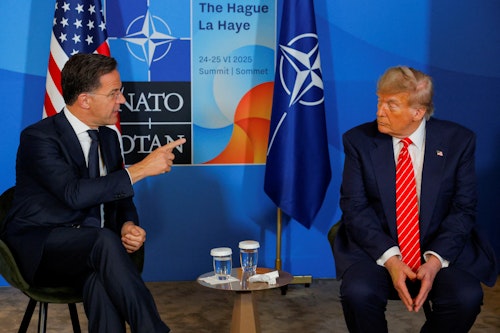
Rutte and Trump at the NATO summit in The Hague, Netherlands, June 25, 2025. REUTERS/Brian Snyder
Trump and NATO chief Rutte have been holding a bilateral meeting.
Here is a summary of what they have said:
RUTTE
- NATO will decide unanimously for countries to raise defence spending to 5% of gross domestic product
- This is about Europeans and Canadians paying more, not American taxpayers
- He praised Trump for getting NATO countries to increase defence spending
TRUMP
- “It is a great victory for everybody I think and we will be equalized shortly.”
NATO spending rise decisions not taken to please anyone, Germany’s Merz says
15:31 +07

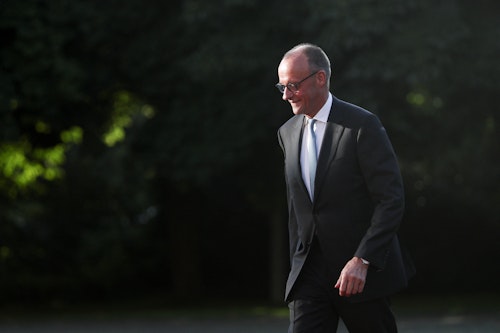
Merz arrives at a dinner for NATO heads of states in The Hague, Netherlands June 24, 2025. REUTERS/Christian Hartmann
NATO allies will ramp up defence spending to counter the threat that Russia is posing to Europe’s security, not to curry favour with anyone, German Chancellor Friedrich Merz said on Wednesday.
“Russia does not only threaten Ukraine, Russia threatens the peace and the political order on this entire continent,” he told reporters.
“We do not take these decisions to please anyone, but we act out of our own conviction that NATO as a whole, in particular the European part of NATO, must do more in the coming years to make sure we can defend ourselves,” he added.
He was alluding to Trump, who has pressed allies to step up military spending.
Belgian PM says it is realistic to increase core defence spending
15:24 +07
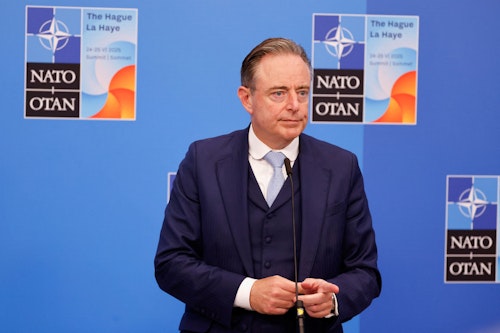
Belgium’s Prime Minister Bart De Wever, The Hague, June 25, 2025. LUDOVIC MARIN/Pool via REUTERS
Increasing Belgium’s core defence spending to 3.5% of GDP within 10 years is realistic, Belgian Prime Minister Bart De Wever said on Wednesday ahead of meeting world leaders at the summit.
“I think 3.5% in 10 years time is a realistic objective. It won’t be easy to get there, but it is what NATO has decided as necessary,” he told reporters, though adding that if capability targets can be met with less, as Spain is planning, Belgium may follow suit.
But he noted that if NATO says it takes 3.5%, “it’s probably true.”
On Sunday, NATO members agreed to raise their defence spending target to 5% of GDP by increasing the core defence goal from 2% to 3.5% and allocating an additional 1.5% for related areas such as cybersecurity and upgrading roads and bridges for military use.
UK to buy fighter jets capable of carrying tactical nuclear weapons
15:17 +07
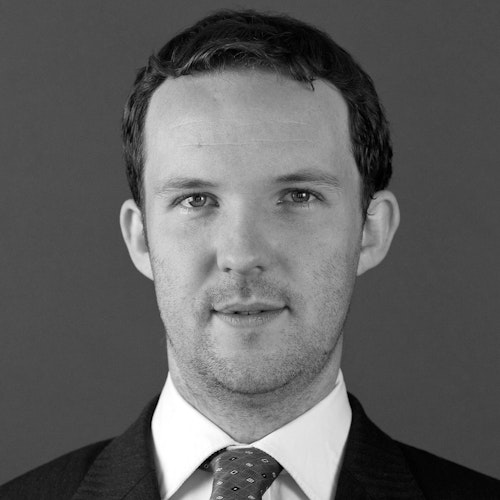

FILE PHOTO: Lockheed Martin F-35A fighter jet at the Paris Airshow at Le Bourget Airport near Paris, France, June 16, 2025. REUTERS/Benoit Tessier
Britain said it would buy a dozen F-35A fighter jets capable of firing tactical nuclear weapons in what it described as the biggest expansion of its nuclear deterrent in a generation.
The purchase of the Lockheed Martin jets would allow Britain’s air force to carry nuclear weapons for the first time since the end of the Cold War, Downing Street said.
“In an era of radical uncertainty we can no longer take peace for granted,” Prime Minister Keir Starmer said in a statement.
The announcement was made as Starmer attends the NATO summit where European members are set to agree a new target to spend 5% of national income on defence and security.
The U.S. will supply B61 tactical nuclear weapons for use on the planes as part of a plan for Britain to take on more responsibility for European security, said a British official.
Britain said the purchase of the jets would allow it to contribute so-called dual-capable aircraft to NATO to carry nuclear weapons in the event of a conflict.
The cost of each F-35A jet is about 80 million pounds ($109 million), putting the total bill for the 12 planes at just under 1 billion pounds, according to another British official.
Zelenskiy to meet Trump
15:02 +07
Ukraine’s President Volodymyr Zelenskiy will meet Donald Trump on Wednesday on the sidelines of the summit, the Ukrainian president’s office said.
In pictures: Summit security
14:54 +07
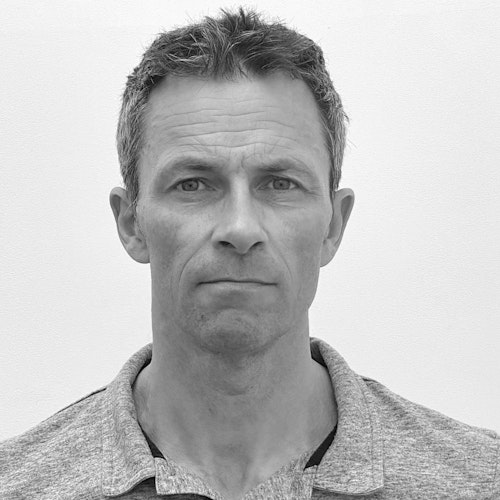
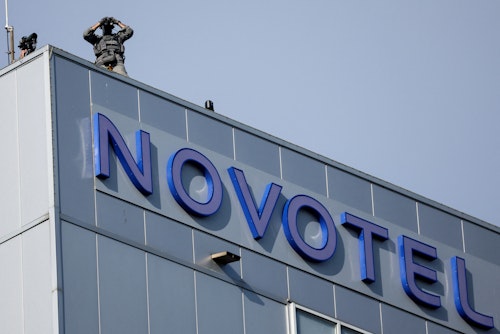
Police take position on top of a building, The Hague, Netherlands June 25, 2025. REUTERS/Toby Melville
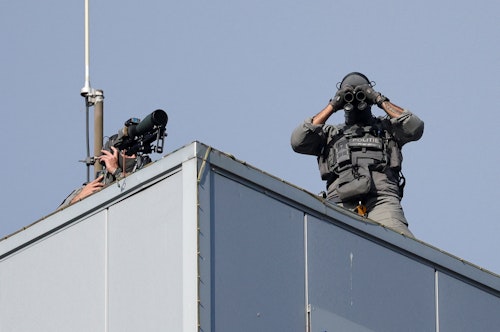
The Hague, Netherlands June 25, 2025. REUTERS/Toby Melville
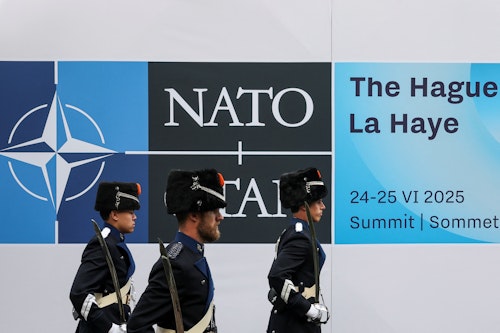
Members of the military wearing ceremonial uniforms at summit venue in The Hague, Netherlands June 25, 2025. REUTERS/Toby Melville
Estonian PM says quite sure 5% NATO spending target will be implemented
14:46 +07
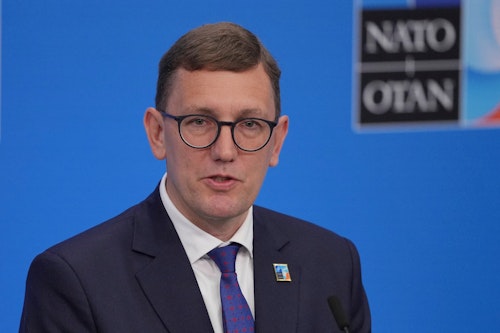
Kristen Michal at the NATO summit in The Hague, Netherlands, Wednesday, June 25, 2025. Kin Cheung/Pool via REUTERS
Estonian Prime Minister Kristen Michal said on Wednesday he is quite sure that NATO members will agree to implement a 5% defence spending target.
History of NATO
14:33 +07

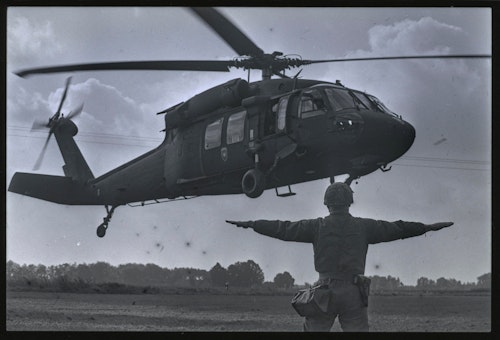
FILE PHOTO: US Army Bell helicopter lands on a field during NATO exercise, Certain Strike, in northern West Germany. September 17, 1987 REUTERS/Michael Urban
The North Atlantic Treaty Organization (NATO) was created in 1949 as a bulwark against the Soviet Union.
The regional defense alliance aims to enhance the stability, well-being and freedom of its members by means of a system of collective security, as defined in Article 9 of the founding treaty.
The alliance’s HQ is in Brussels.
Since it was created in 1949, it has grown from 12 founders to 32 members.
Membership is open to any “European State in a position to further the principles of this Treaty and to contribute to the security of the North Atlantic area”.
Its newest member is Sweden which joined the organization in 2024.
The group celebrated its 75th anniversary last year.
Ukraine has stepped up its efforts to join NATO following Russia’s invasion in 2022.
In May, Russian sources told Reuters that President Vladimir Putin’s conditions for ending the war in Ukraine include Western leaders’ pledge in writing to stop enlarging NATO eastwards to Ukraine, Georgia, Moldova and other former Soviet republics.
